Earlier this year, the music world was graced by an outstanding record, “Rough Dimension”, by the LA act VR SEX. The band of a controversial name and equally controversial artistic concept was not only of great interest to me but to the London crowd as well. The sold-out Shacklewell Arms could attest to that. I met the guys for a chat before the show with an open mind, though slightly nervous, partly because I take this project seriously, like everything else that Andrew Clinco does in the creative space.
The band’s insights into subjects that deal with the human condition and life on the margins are utterly inspiring, and so is their sound, which is reminiscent of the likes of Chrome, Wire and other bands of the same era, but with a modern twist and fresh and original perspective.
And just as they mentioned Tuxedomoon, the pub played “No Tears”, and I take those little synchronicities in life as good omens. The band graciously shared their history and inspiration and talked me through the recording process and the general idea behind their creative endeavours. With four brilliant releases under the belt and extensive USA and European tours, we can expect to hear more from them in the near future.
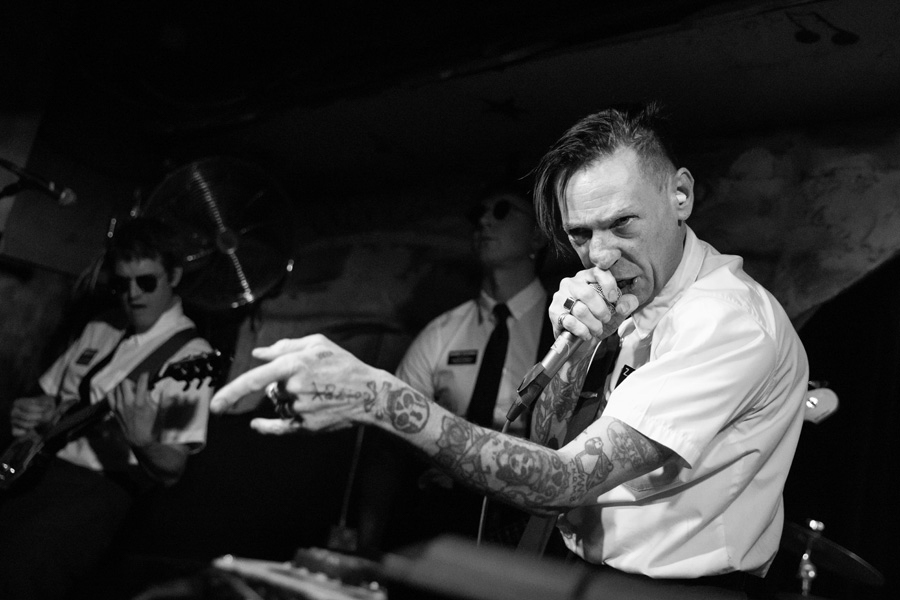
Let’s talk about the name VR SEX. Can you explain a little bit about it?
Noel Skum: It’s a genre of a pornographic film.
Does VR stand for virtual reality?
Noel Skum: Yeah, yeah.
So why did you decide to name the band VR SEX?
Noel Skum: For a couple of reasons. One, I think it’s kind of the weirdest form of sex technology. There are lots of different new developments in sex tech, and this one, I think, is by far the most absurd. It’s not a sex doll; it’s not a dildo or a blow-up doll. It’s a video game, in a sense.
So what’s going on in virtual reality sex?
Noel Skum: It’s your wildest fantasies acted out in a three-dimensional atmosphere.
Z. Baron: So, the funny thing about that is that our bass player, who’s been a part of our team and other bands, is a porn star, so his day job is a porn actor. So, our bass player does porn, and his speciality is doing VR porn, where he has to wear this device on his head while he’s filming having sex with a partner. Before the band was named, he was telling Andrew about this, and that kind of clicked, so what a brilliant sort of concept and band name. So, actually, we’re not posers at all; we have VR porn people in our band.
The “Rough Dimension” press release described your music style as acid punk. There’s a mix of genres we can hear on VR SEX releases that many music journalists tried to pinpoint with more or less precision. What did you try to create in terms of sound? How would you best describe your music style?
Noel Skum: It was important for this record to have real drums on it. It slowly started moving towards a full band with the addition of Mike on the EP prior to the album you’re talking about. He started singing background vocals, and that was almost the fourth member that we added. So once we started doing harmonies, he came along and started adding these harmonies that I really liked and then I thought, oh shit, this album needs to be something closer to a real rock band. It’s originally founded in a kind of more of a classic late 70s British punk sense, like Alternative TV or Wire or Buzzcocks, The Stranglers, we’re kind of akin to that, but a little weirder with a San Francisco kind of freakishness, kind of where the acid part comes from because we all love Chrome and bands like Tuxedomoon and stuff like that.
So how would you best describe the sound besides acid punk?
Noel Skum: Big, expensive, wide, stereo, layered, dimensional, distorted.
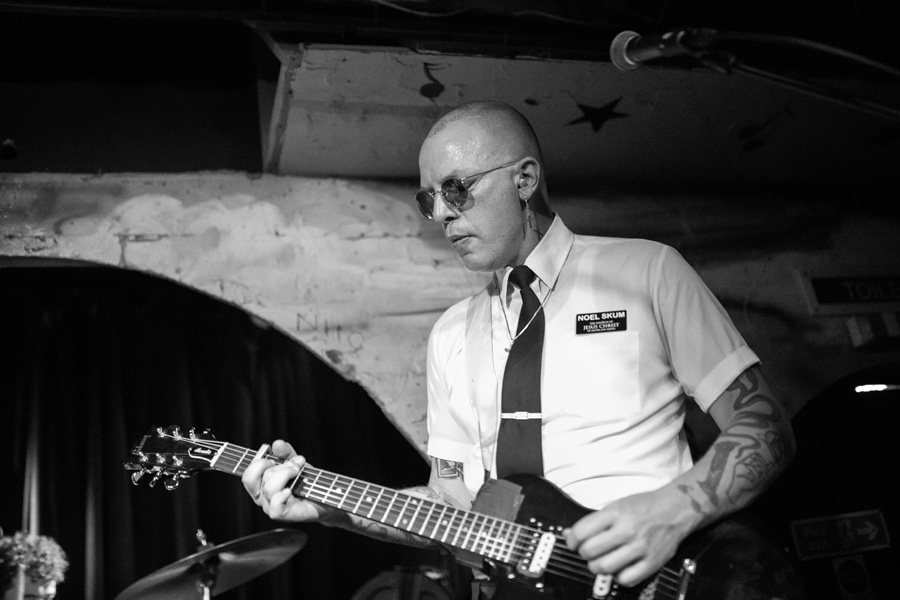
Compared to Drab Majesty, in this project, you address somewhat different subjects. Why do you focus on the human condition and the underground life of LA? What inspired you to explore that subject with VR SEX?
Noel Skum: That kind of stuff is on my mind all the time, so it’s not really like conscious. This is kind of the stuff we’re all into really as a group, the things we talk about. Even if this band wasn’t around, we would be talking about these concepts; drug usage, poverty, weird sexual things, taboo stuff; all these things are a part of our conversation, to begin with. Drab Majesty is more of a conscious effort in talking about something esoteric or ethereal or even interdimensional time of the cosmos, etc., but this stuff is more on the ground and the clear, immediate issues.
Something that you encounter every day?
Z. Baron: Living in Los Angeles is quite strange; you have these wealthy people, you have this really poor element, you have everything in-between, and when you’re in a music scene, specifically, you encounter people from the movie world or this or that, and it’s a strange sort of experience, a cross-section of people and I feel like a lot of the lyrics and sort of the concepts of the songs of VR SEX is kind of viewing this world that we live in from our perspective. And a lot of times, it’s like we’re not considering it positively, so we’re kind of trying to bring that to people, this is how we see this world.
Noel Skum: It’s not glamorous.
Where do you find yourselves in LA?
Z. Baron: We find ourselves in a bubble, in a strange bubble. We’re sort of different in-between cultures, but we have our own culture.
Noel Skum: Yeah, he (Z. Baron) works in the entertainment business as far as, like, the bartending and production etc. Mike is also in the music industry, but he’s on the production side as well; he’s an engineer and producer; he runs a studio but also has worked in lots of clubs, so he deals with tones of different talents and personalities. I had a father in the music industry, but he wasn’t like a star on a stage; he was more like a hired gun, kind of behind the scenes. So, I grew close to that stuff, but I always thought that that side is a little strange and superficial, and I have a lot of friends growing up in LA who were on TV and became actors and actresses.
It just always seemed kind of a silly pursuit to me. I mean, here we are now somehow in some sort of limelight, but it’s just a fact of the matter of being a musician. If you wanted to do anything, you gonna be on TV in some capacity or published in some way, that’s just a necessary evil, but I think our critiques lie more in the darker side of Hollywood.
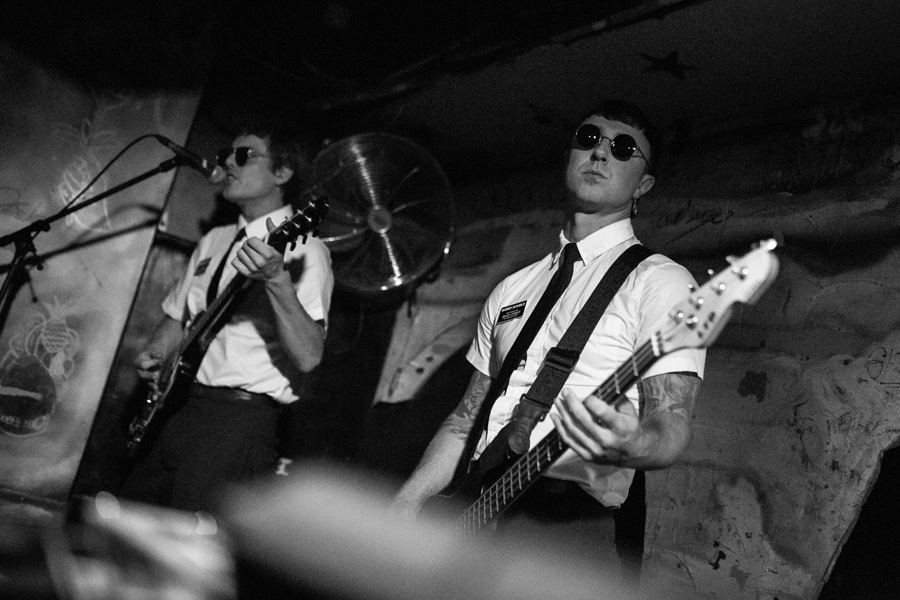
Your moniker Noel Skum is an anagram of Elon Musk; why did you choose that name?
Noel Skum: Oh, because it’s clever, it’s weird. I’m not a big fan of Elon Musk, but I’m fascinated by him.
What made you think, ok, I’m going to play with his name and come up with this?
Noel Skum: Because you can’t escape him in the media. The guy has the most concentrated amount of power; he’s like the top 5 celebrities in the world. I like to play on words, but this is not as an anagram; this is when you switch the letters, so I think it’s a funny one. Having stage names is always fun, so you can step outside yourself. We all have stage names; it’s nothing too deep.
In your work, we can hear a lot of distorted guitars and vocals, which certainly remind me of a few names, like Chrome, and Helios Creed, especially on “Human Traffic Jam”, and then Wire comes to mind too. It’s vastly different from the Drab Majesty sound. Did you feel you had to have another outlet for this kind of musical expression that didn’t fit the idea of DM? How did you start to explore this musical expression?
Noel Skum: This music was the first stuff that I actually made, partly around 2010-2011. I was kind of just getting back into the guitar, not really knowing much. I’d played the guitar as a young kid, but I stopped for many years, and when I learned just power chords, I wanted just to play heavier music. I started making this music, but I didn’t know that many people in Los Angeles and couldn’t find a way to build a band. So I said, ok, well, there’s this other thing that people were doing where they’re just playing by themselves with a drum machine and that world appealed to me too at the time. Now I think it’s kinda silly just playing with a drum machine on stage.
Some people can do it, Drab Majesty, almost kind of, does this, we’re two people, so there’s more performance. There’s not much anything deeper. It’s hard for me to play just one kind of music, one style of music; it’s like I just don’t wanna eat pasta every day. It’s very important to have multiple outlets.
Did you have a particular interest in the sound prior to making music for VR SEX?
Noel Skum: Yes, most definitely, absolutely!
Contrary to the experimental sound of “Human Traffic Jam”, “Rough Dimension” is more melodic with catchy choruses. What was your vision behind both releases, and which avenue did you want to explore sound-wise with each one?
Noel Skum: Yeah, it’s just more of the progression from still not being able to find drummers and bass players. I eventually set out to make a record the same way I would make a Drab Majesty record with the drum machine, layered, overdubbing, playing everything myself. That’s what “Human Traffic Jam” was and “Horseplay”, and I was just based on the condition, still not being able to find a drummer and not being able to find a bass player.
But those two albums sound different, “Human Traffic Jam” is more experimental and “Rough Dimension” more structured. How did you decide on the particular sound of each one?
Noel Skum: Here’s the thing, musicians actually don’t always go into records with objective, with a plan, like, I wanna explore this sound on this record, you just start making songs. You just gotta start walking in the direction and then decide, oh, this street looks nice, I’ll go down here. By the end of the record, you can say, well, I enjoyed exploring these things or the parts I wrote for the records I liked more like this…
So you say it’s not always deliberate?
Noel Skum: Never!
Mike X.: You can always trace your steps looking backwards.
Noel Skum: Frankly, I think it’s easier to go in with no plan and no expectations and just be willing to accept what comes out and then kind of start moving in that direction, ’cause if you’re like, I wanna make a record that sounds like this, then you’re just gonna fail.
Z. Baron: It’s been mainly Andrew, Ben, and then Mike and myself on the records, and we’re just kinda like, oh, that sounds cool. It’s never like, let’s make this song sound like this band or anything.
Mike X.: No surprise for the writer, no surprise for the reader.
Z. Baron: We obviously have our influences, you know, Chrome was a thing, but I know when Mike got doing overdubs, it was like, oh, let’s try this, it might sound cool.
Mike X.: Yeah, I remember there’s one melody that we chose on that 7-inch that was like a country melody. We said, fuck it, let’s go!
Noel Skum: Yeah, as soon as we hear, we know how it relates to music history, it’s what we’re doing, but it’s never like going through my book, should we try… We listen to so much music we recognize these ideas very easily.
Apart from the fact that the lyrical subject is about living on the margins, vanity, and decay, there’s also a sense of dark humour. Would you say it’s a way to create some very much-needed distance from the grim and stifling reality of the society we all live in? What, in your opinion, would be the healthiest attitude to the subjects you talk about?
Z. Baron: As musicians and people, we don’t take ourselves too seriously, so we try to have fun. I know Andrew definitely does, and I try to have fun with the lyrics but also kind of reference real things in our life. But we try to make things not very direct; you kind of have to read between the lines, I think, on a lot of the lyrics, but if you understand who we are as people, you’ll understand exactly what we’re talking about.
Who does the lyrics?
Noel Skum: I do most lyrics.
Do you take suggestions from the band?
Noel Skum: Of course.
Z. Baron: On the lyrics, we collab, he does a lot of them, and we’ll write some words, lyrics, and then we’ll collab. Andrew is really talented with words.
I think I probably got you some views on Youtube by watching “Dog Complex” I love the video, I love the lyrics, and I totally get it.
Z. Baron: And that’s a serious subject matter that we’re talking about, but we’re having fun with it.
But you showed it in a fun way.
Noel Skum: We’re always kind of smirking at everything we do. Nothing is like, oh god, I’ll pour my heart and soul… there is that, no matter what I do, that’s not a joke to us, but everything is playful, it has to be, even the most morbid themes, we have to laugh at.
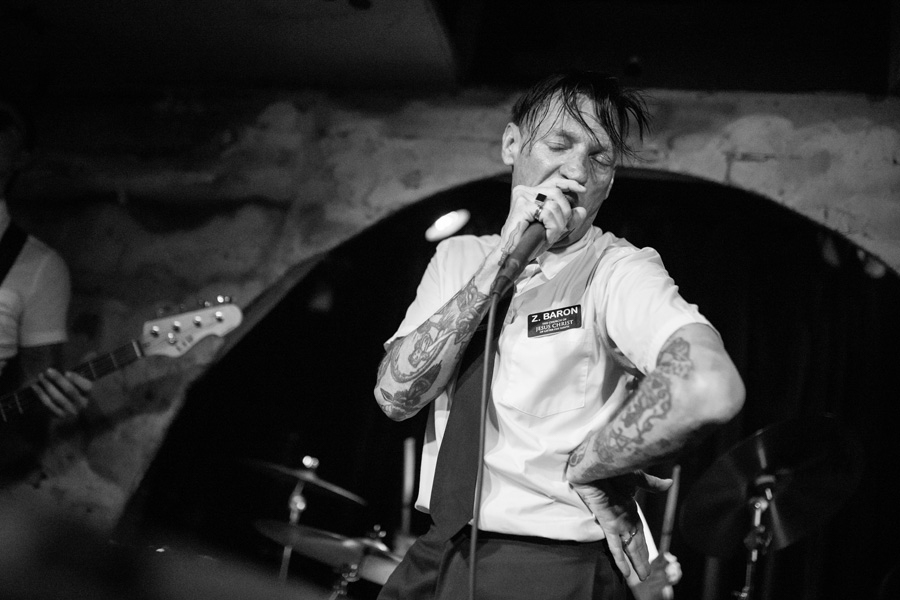
As I understand, you also view technology as tools for salvation and damnation. Can you elaborate on that thought further?
Noel Skum: The Internet was initially created to be this space of global sharing of ideas, like the world library essentially of any publication you want, any information you want, at any time. Look how absurd it’s become, just on a very basic level. Human interaction it’s meant to connect us all, but it’s also destroying us at the same time too. It’s eroding human interaction, eroding conversation and then if you look at pornography, I would say also, and I totally support people who work in the sex industry, I do think it is warping the minds of a lot of young men who think that that’s how human interaction works, and studies have shown it is.
Z. Baron: But once it comes to real life, people are like, oh, shit, that’s not how it works in real life, and it might depress people. At my age, Tiktok depresses me.
You wrote and demoed both albums alone and recorded with Ben Greenberg. Could you tell us a little bit about the process? How enjoyable do you find doing albums that way? Does it ever get challenging?
Noel Skum: That’s the only way I prefer to do that. I have no illusions about what I can and can’t do in the studio. I can make a demo at home, but what guys like Mike and guys like Ben can do… Ben and Mike are friends, and they come from a similar world of recording. They do it in a much higher and more scientific level. I can describe the sound I want, and I can approximate it in a demo way, but by no means do I know how to really sculpt these things. So it’s nice to be able to kind of convey a thought, give a demo and have someone listen to it and be able to translate what I’m trying to say. Like, oh yeah, I hear where you’re going with this demo, and I know exactly how to make it way better. The whole game of recording, for me at least, is you make demos, and you try to beat them. You have it as a blueprint, so you’re just not completely wandering the studio.
On those releases, you worked exclusively with Ben, but on “Cyber Crimes”, you had other people involved. How did that come about?
Noel Skum: Mike was one of the guys involved.
Mike X.: It was the pandemic, and he just gave me a call, and I took an Uber over to his house in Pasadena, it was like 35 minutes, and we just worked on it. He already had demo stuff on his computer, and then we just kind of started from there.
So what made you decide, like, I’m going to get other people on board for this one?
Noel Skum: ‘Cause I have friends!
Z. Baron: In Los Angeles, our friend network in our music is a pool of like incredible talent.
Noel Skum: Hard to find a drummer, though; I’ll go back to that.
The first single and video from “Rough Dimension” was for “Victim or Vixen”, followed by “Walk Of Fame”. Can you talk us through both videos, especially the appearance of the Jesus impersonator Jesse Christmas and the LA icon Angelyne in the “Walk Of Fame” video?
Noel Skum: It’s all in the statement on Youtube, but this guy, we found him on Hollywood Boulevard. He was like a crazy derelict homeless guy dressed as Jesus; he just wanted to be in the video. But he’s also a rock star, so we wanted to show both his daily life as a Jesus impersonator and a rock star. I thought it was really interesting.
How did you find Angelyne?
Noel Skum: I’ve always been a fan of Angelyne; I just messaged her on Instagram. She’s cool; we’re friends. That’s cool you know about Angelyne.
I watched a few documentaries about her; I was interested. She was the first influencer before the Internet.
Z. Baron: What people don’t know about her, and I didn’t for a long time, was that she was an actually really talented singer and musician and her records that she’s put out are total 80s new wave bangers. So if anyone hasn’t heard her music, I recommend that they find her.
How do I find her music?
Noel Skum: Spotify and Youtbe.
Z. Baron: Her music is amazing. I’m surprised people have slept on it; I’m surprised I’ve slept on it for so many years.
“Victim or Vixen”, what’s with the mask?
Noel Skum: It’s not a mask. It’s a person, a horrible, disfigured person.
How did you find her?
Noel Skum: They live under the freeway in Pasadena. I picked her up; I gave her some money, I gave her some booze, and she goes around town. I know, it’s pretty sad.
What made you choose her?
Noel Skum: She’s in a place that I would go down, and I would party with some friends under the bridge, and she lives there in a kind of a weird tent structure. She’s amazing, looking like a bad burn victim.
You perform live as a band. How did you guys find each other? To what extent do other band members contribute in the creative sense?
Noel Skum: Mike was doing sound for Drab Majesty for many years.
Mike X.: Actually, now we’re talking about that; I have no idea how we met.
Noel Skum: I don’t know how I met him.
Z. Baron: When Andrew and I met, I was playing in another band called DBC (Dangerous Boys Club), and we’re on Dais records as well. When I came down and moved to LA, we had a sort of like a Dais records hang when we all went and saw some movie, and I think Andrew has just signed to Dais, and he was the tallest dude in the group and we all kind of met then. We talked about doing a band together, like in any big city like LA, you hear a lot of we should do something together. Anyway, we ended up actually making it work, so we started doing that. Mike was doing sound for us and touring with us, and then we knew Chad; he was a part of the scene, he was the porn guy, and he plays in a couple of other bands. We’re now procuring Marley via Mike.
Mike X.: Marley moved to Los Angeles three months before the pandemic lockdown, he’s from Austin, and he was flying out to do a job as a session drummer; he was working on records that I was recording. When he moved here, I was like; we should get this guy, this guy rocks. He’s a fantastic drummer.
So creatively, how does it work between you guys?
Z. Baron: Great! We’ve been kind of writing songs, the 5 of us together; we’re kind of breaking a little bit away from one to two, three people writing team. We’ve been playing together as a five-piece for about a year now since, towards the end of Covid, we’ve been playing together.
Mike X.: Andrew’s very graciously open to us; we’re all kind of re-visualising the recorded material as a five-piece. So it’s like, we’ll learn the tunes on our own, and then all come together and kind of change stuff around; we’re not verbatim playing the recorded material.
Z. Baron: So if you come to a VR SEX show expecting to hear the songs as they’re on the records, you’re not gonna get that. It’s a little different, and it’s more exciting.
Every release on your Bandcamp comes with a short but quite philosophical essay which explains the intention and nature of your creation. How important do you think it is to inform the audience on the subjects that matter to you and that shape the releases?
Noel Skum: Only so much. I think it’s important to guide them into the basic kind of intention behind the record but not song for song, word for word; I don’t like that at all. I like lyrics that are free to interpret. I mean, you listen to a Wire song, Colin Newman writes, and almost nothing he writes about, you’re able to really pinpoint what he’s saying.
Who writes that stuff on Bandcamp?
Noel Skum: It’s a combination of me having a conversation with someone that does the writing for Dais. We have a long, like hour and a half conversation about it.
Do you think you need to explain anything about the records?
Noel Skum: Just a little bit. I mean, the label wants that. If it was up to me, I wouldn’t say anything personally, but I don’t see the harm in it. But I do see the harm in holding someone’s hand and telling them every single thing on the record because then it’s like, well, if a song really resonates with them and it’s not about that, then that person might not really take it as personally as they could have if there’s not a lot to make it theirs. I think ownership over a song as a listener is a really important thing too.
What’s the inspiration behind your visual identity, both the artwork and your stage image?
Z. Baron: So, as far as how we look or appear, we just kind of like to have fun with our looks and stuff. I feel like each kind of record and thing that we’re promoting or touring on, we have a different look, and so, for this record, we like to wear ties and white shirts. It’s just fun to have like a sort of a uniform; it kinda makes us stand out from a lot of other bands that are doing whatever we’re doing.
Who does the artwork?
Noel Skum: I do the artwork.
What’s your visual style?
Noel Skum: I like something that’s distorted, like the way the guitars are distorted, nothing too clean, nothing too clear. The album cover is very literal, you have a man in a business suit who embodies basically and possibly a capitalist, or just a businessman or just a modern man, and he’s at a dead end, and he’s in a dimensional space. The name of the record is a double entendre where you get the rough dimension, something that’s like the rough sketch of something and then the present space we’re living in. It is its own dimension, and it’s hard to deal with.
In one of the interviews, you said, and I quote, that “Being a musician is one of the most vulnerable professions”, and I have to agree with that. Your work sounds truly genuine, and I think people are naturally drawn to authenticity in your expression. How important is it for you to keep your work sincere and put it out there to be scrutinized by the audience and critics? Does it ever feel difficult, or does it feel liberating and rewarding?
Noel Skum: It’s not difficult because nobody’s opinion really matters, and I’m ok with that. The only ones that kind of matter are from people that I love and respect, and those are my peers, but typically, for the most part, I have a very good relationship with my own music and the way my peers receive it. And also, my feelings aren’t hurt if someone I like doesn’t like my music. It doesn’t really matter. I think that’s the hardest thing for a lot of people to get over, though, is putting their music out there and then all of a sudden, now it’s in anyone’s hand, and anyone can say what the fuck they want about it. So, it feels very naked; I can’t imagine how Chad feels while doing porn.
Why do you think that being a musician is a vulnerable profession?
Noel Skum: I mean, any art that leaves your bedroom that goes into a public space is a level of being vulnerable, for sure, it’s very difficult if you love it.
So now you say it is a bit difficult?
Noel Skum: No, for me, it’s not difficult. But I understand why it’s difficult, in general. I understand why there are amazing talents that chose not to put their music out there because they don’t want to deal with having put it in the eyes of the public and have written about and critiqued and have nobody come to their shows or have people come to their shows and tell them they didn’t like it. All those things are terrifying.
Does it matter if you have 20 or 200 people come to your shows?
Noel Skum: No, it doesn’t matter, it shouldn’t matter. It should only matter that you had a good time doing it and you enjoy making the music and that I think is a recipe for success on some level.
It feels liberating, for sure. Finishing a project is very nice. It’s never the way you wanted it to be; like going back to that question, it’s never the way you set out for it to be, but it’s nice to be done with it and move on to the next thing. Not finishing something is very painful.
Referring to the same interview, you talked a lot about your passion for music in general, and I assume it also inspires you creatively. On the other hand, I’ve heard frequent explanations from other music artists who were inspired by visual art such as paintings, photographs or even sculptures. Is visual art something that could inspire or move you to such an extent that you could translate visually into sound?
Noel Skum: It’s not usually that visual art really inspires my music, more like just the visual world. And it’s also, everything is art around us. Creating using the outside world to influence the inside thought process is one thing, but I don’t go to the museum and see a Vermeer painting and say, OMG, I want to write a song about it.
Yeah, but you can always see a photograph on the Internet and see something in it.
Noel Skum: Yeah, there are certain people on Instagram who are very interesting, disenfranchised people that live alone and publicly show their lives. Those people are very inspiring to me; I find that to be a very interesting thing to observe.
You started out as a drummer; what led you to a guitar? You also have a finger-picking playing style. Was that a particular guitar sound that you were after from the beginning, and what drew you towards it?
Noel Skum: I like the guitar arpeggiation; it’s what it’s called arpeggio, where you play a chord, and then you play the notes of the chord. It’s very appropriate for kind of a new wave guitar style. I like a classical guitar too, but it only gives you so much out of the guitar. If you play with the pick, it gets louder; you get a more full-bodied sound; also, I just picked the guitar because I was tired of playing an instrument that was non-melodic. Playing the drums is fun to some degree, but you can’t just go home and play the drums and write a song on the drums. If you just have a guitar, you can write a whole record; you can write a whole song on it. It even has a percussive aspect to it, so, for me, it’s more inclusive.
Why and how did you create Deb and now Noel? Can you draw a line between those characters and your own identity, or do they sometimes overlap? Have you ever felt that they could be taking over, or do you feel fully in control? In which ways do the personas facilitate you, do you feel them to be an extension of your creative endeavours, or do you view them as a useful addition to your visual image only?
Noel Skum: I don’t want to give too much away on that. It’s not going to be a mystery anymore.
I think Noel is more me right now, as my daily person, but Deb is more of a conscious step into a more performative space. I don’t wake up, and I’m that character that’s more just strictly for the stage.
You know that Bowie killed Ziggy at one point.
Noel Skum: Yeah, I will kill it at some point, too, for sure.
Do you think that there would ever come a time that you’d perform as Andrew Clinco?
Noel Skum: Probably yeah, when I’m older. I mean, I am all every time, depends just how you want to frame it.
You’ve already toured the USA, and this is your first European tour. How are you pleased with it so far?
Noel Skum: Awesome, fantastic, we love Europe!
Compared to the US?
Noel Skum: Way better!
Europe is better?
Noel Skum: A hundred per cent, oh yeah!
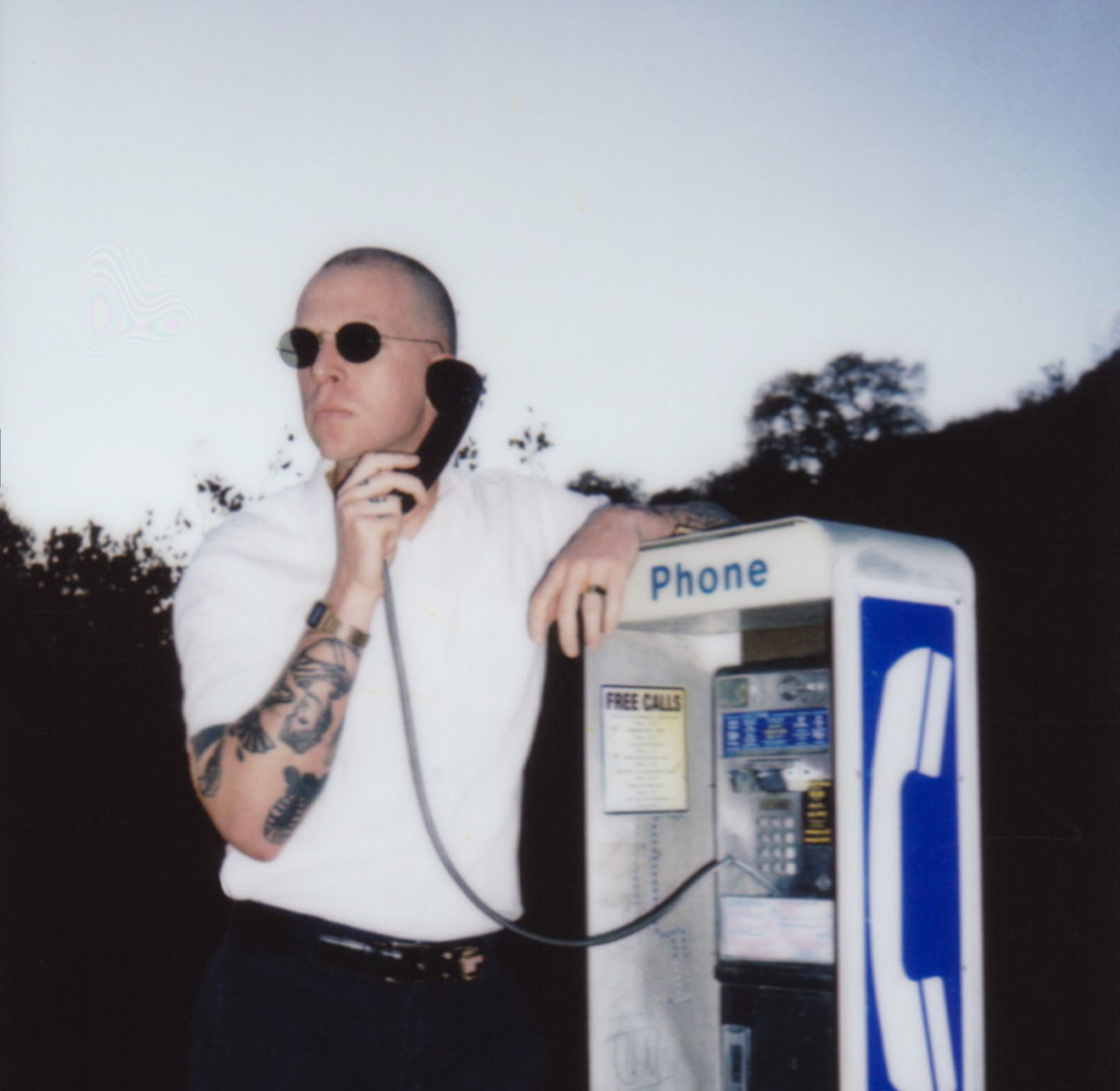
What’s next for VR SEX?
Noel Skum: More writing, more touring.
Z. Baron: We’re kinda on a roll, so we’re gonna keep it going. We’re in the midst of writing music for VR SEX.
Any news about Drab Majesty?
Noel Skum: And Drab might have a release in 2023, EP.
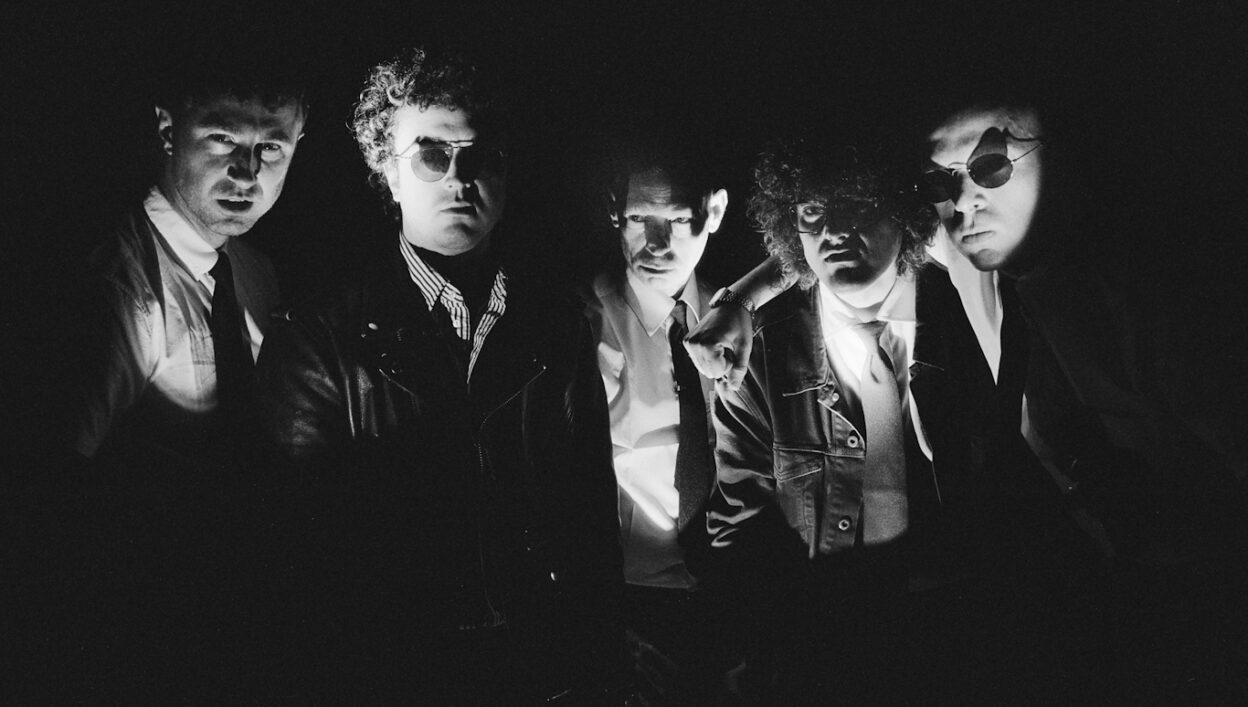

Be the first to comment